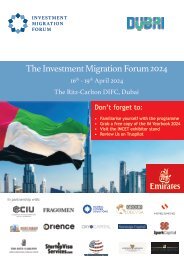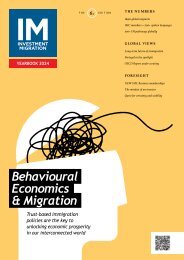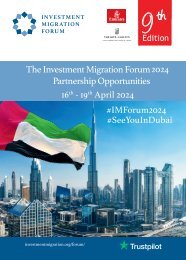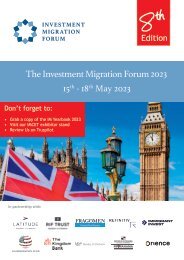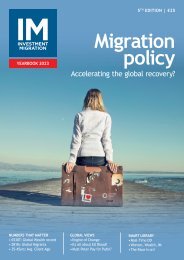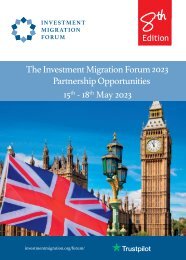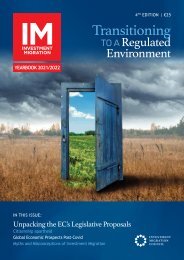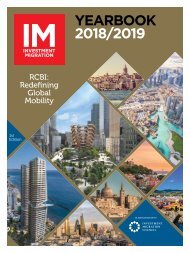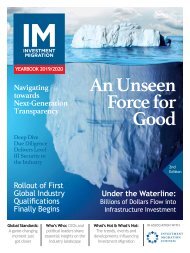IM Yearbook 2020/21
Born from the need for a global, credible, “go-to” publication, the 3rd IM Yearbook offers valuable access to a prime target audience of top industry influencers, decision makers, and the foremost referral network to the world’s most influential Investment Migration programmes: Government officials such as Heads of CIU’s, policy makers, academics, migration agents, law firms, wealth managers, financial advisors, real estate developers, and international firms involved in investment migration.
Born from the need for a global, credible, “go-to” publication, the 3rd IM Yearbook offers valuable access to a prime target audience of top industry influencers, decision makers, and the foremost referral network to the world’s most influential Investment Migration programmes: Government officials such as Heads of CIU’s, policy makers, academics, migration agents, law firms, wealth managers, financial advisors, real estate developers, and international firms involved in investment migration.
You also want an ePaper? Increase the reach of your titles
YUMPU automatically turns print PDFs into web optimized ePapers that Google loves.
As enhanced data privacy<br />
restrictions are enacted<br />
in jurisdictions around the<br />
world, due diligence processes will<br />
have to adapt accordingly, and, in<br />
some jurisdictions, it will be necessary<br />
to find alternate legal methods of<br />
obtaining meaningful intelligence.<br />
Laura Austin<br />
LA: The changes implemented in light of Covid-<br />
19 showcase the adaptability of the CIUs, and<br />
in many ways are another great example of<br />
positive progress emerging from the pandemic.<br />
From a due diligence perspective, the more<br />
comprehensive information and documentation<br />
we have at the start of an investigation, the<br />
better and more comprehensive the output<br />
will be. However, this is in no way positing<br />
that comprehensive and high-quality due<br />
diligence cannot be conducted without the<br />
comprehensive set of required documents<br />
in hand. In reality, due diligence, when<br />
conducted properly, only partially relies on<br />
the documents and information reported,<br />
while equally relying on intelligence and<br />
information that was not disclosed.<br />
Additionally, it is worth noting that to<br />
date, we have not seen a significant number of<br />
files submitted to us with missing documents.<br />
Certain of the documents we have received<br />
have not been notarized, as notaries in many<br />
countries were not available during lockdown<br />
periods, but with the exception of a few<br />
jurisdictions, the lack of a notary stamp does<br />
not typically impact our ability to confirm the<br />
document with official in-country sources.<br />
There is rightfully a concern on some<br />
level about an impact to the due diligence<br />
process if, for example, a significant number of<br />
documents are absent at the time the diligence<br />
is initiated, but this has not been our experience<br />
to date, and we are confident that the CIUs<br />
will continue to apply adequate standards<br />
when it comes to the documents received and<br />
the initiation of the due diligence process.<br />
EL: We support the adoption of technology<br />
to assist both applicants and the CIUs.<br />
Whilst supplied documentation is, of course,<br />
fundamental to the process, it does not tell<br />
the full picture and our checks online and<br />
in-country enable corroboration of genuine<br />
information and discovery of false or<br />
misleading information. We work alongside<br />
the CIUs when conducting verification, and<br />
if a perceived issue or threat is identified,<br />
we would always liaise with the relevant<br />
CIU and request further documentation to<br />
alleviate concerns. As technology develops,<br />
we believe that the application process<br />
can be streamlined and, potentially, allow<br />
for verification to be more transparent.<br />
How do you expect the due diligence<br />
practice to develop in the next five years?<br />
SW: I think there will be further significant improvements<br />
in the process of risk assessment and lower-risk application<br />
vetting, driven by technology and automation. As more data<br />
becomes available in digital format and Machine Learning<br />
and Artificial Intelligence tools become smarter and more<br />
available to practitioners, the vetting process will become<br />
faster and more seamless, particularly for low-risk applicants.<br />
However, where the risks remain high—either because of lack<br />
of transparency, lack of documentation, remote location in highrisk<br />
perceived countries—local and human based intelligence<br />
will remain the sine qua non of effective due diligence.<br />
JS: Hopefully we will start to see a more uniform adoption of<br />
due diligence for agents and governments across the industry.<br />
This is especially critical for the Western European residency<br />
programmes that deal in high volumes but seemingly do very<br />
little due diligence. Ideally, these Golden Visa programmes<br />
would adopt the minimal due diligence standards outlined<br />
in the <strong>IM</strong>C-coordinated reports, publicly outline what level<br />
of vetting takes place at the applications stage and what<br />
risk-based approach is taken when making decisions.<br />
LA: Technology will continue to play a significant role in<br />
the evolution of the due diligence industry, both in internal<br />
process enhancements and end-user offerings. We expect<br />
significant advancements in internal technology solutions that<br />
allow for added efficiencies in record retrieval, analysis and<br />
reporting, leading to improved turnaround times, increases<br />
in capacity, and more sophisticated levels of risk-based<br />
analysis. For end-user solutions, we also expect enhancements<br />
to risk rating and post-investigation monitoring tools.<br />
External to enhancements from providers, the next five years<br />
promise to bring additional data privacy measures in a number<br />
of jurisdictions, including increased use of anonymization<br />
and pseudonymization in records. As enhanced data privacy<br />
restrictions are enacted in jurisdictions around the world,<br />
due diligence processes will have to adapt accordingly, and,<br />
in some jurisdictions, it will be necessary to find alternate<br />
legal methods of obtaining meaningful intelligence.<br />
EL: With ever greater scrutiny on programmes by the media and<br />
policymakers, it has become vital to ensure that every application<br />
has been checked and all sources verified. Digital passports<br />
and IDs will change the way we all verify our identities, both at<br />
home and when travelling. That will inevitably alter the way in<br />
which verification for citizenship takes place and should allow<br />
for better initial checking. We also support the <strong>IM</strong>C’s work to<br />
establish best practice in due diligence and that will help to allay<br />
the fears of some on the quality of citizenship granting.<br />
80<br />
Investment Migration <strong>Yearbook</strong> 2O2O/2O<strong>21</strong>




